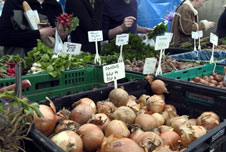| Li: | Hello, I'm Li and welcome to The English We Speak, and today I'm here with Rob. Hi Rob. |
| Rob: | Hello Li. Now come on Li, concentrate, I need you to help me finish this quiz in the newspaper. If I get all the questions right, I might win a holiday. |
| Li: | Oh right. I love quizzes, especially if it means you can win a holiday! OK Rob, what's your next question? |
| Rob: | Right. It says here, what is the capital city of Chile? |
| Li: | Easy. Santiago. |
| Rob: | Good. Next, what is the name of the world's largest ocean? |
| Li: | The Pacific—of course! |
| Rob: | Wow—you're good Li. You really know your onions. |
| Li: | I know my onions? Err, was there a question about onions?! |
| Rob: | No Li! |
| Li: | Good, because that is one thing I don't know anything about, onions—except that they make me cry. |
| Rob: | Don't cry Li. It's a compliment. If someone says you know your onions, it means you are experienced in something or you know a lot about a particular subject. So really, it means you're clever! |
| Li: | Oh really?! But why 'onions'? |
| Rob: | It is a strange term and some people say it comes from a man called S.G. Onions who made fake coins to help teach children about money. If they learnt about money they would know their onions. |
| Li: | I see. But I suppose now we just use it as a silly expression. |
| Rob: | We do. Like this ... |
| Rob: | Well, knowing your onions or knowing your stuff, is very useful when you're doing a quiz like this. So Li, here's another question Li. Complete the name of this flavour of crisp ... 'Cheese and something ... ?' |
| Li: | Oh, that's tricky ... cheese and ham? Cheese and apple? I've got it! It's cheese and onion crisps! |
| Rob: | Brilliant Li. You really do know your onions. And now I might win a holiday. |
| Li: | That's great but who are you going to take with you? |
| Rob: | Probably my girlfriend. |
| Li: | Oh right. I didn't want to go with you anyway—you have got onion breath! |
| Rob: | Oh dear. Join us again soon for another programme about everyday English sayings. |
| Li: | Bye! |
